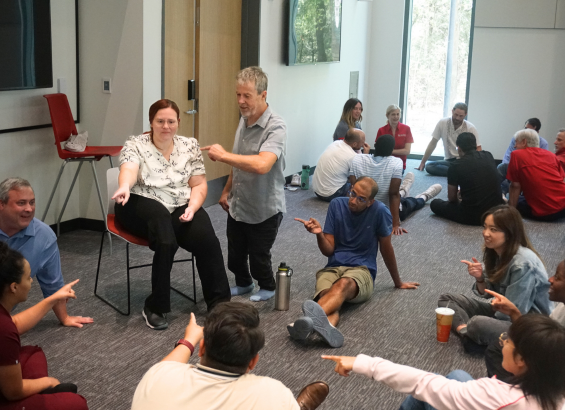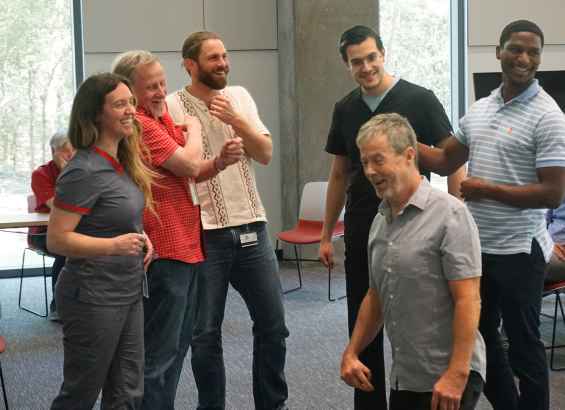
University of Houston Tilman J. Fertitta Family College of Medicine students, faculty and staff had the opportunity to participate in a truly unique exercise. To produce students that understand non-medical drivers of health and alleviate social inequities, guest speakers and professors are routinely invited to lecture and lead workshops at the College of Medicine. Dr. Austin O’Carroll of the North Dublin City General Practitioner Training Programme came to the Fertitta Family College of Medicine to share the importance of understanding this quality and how to better serve our communities.
O’Carroll has a long and personal background regarding health disparities and has used this experience to form one of the most sought-after general practice residencies in Ireland. He was exposed to thalidomide in the womb, and due to the effects, spent a substantial amount of time in hospitals and has significant mobility challenges and manual disabilities. O’Carroll spent much of his youth working and volunteering in inner-city Dublin visiting the elderly and people with disabilities. According to the Irish native, “This is where my love of the inner city, an area of blanket deprivation, first developed. I worked in my late twenties with a disability advocacy group and here I learnt about a rights-based approach.”
He has worked as a general practitioner in inner-city Dublin since 1997, and there he continued to see the ravages of health inequities and the impact they have on deprived communities. Health inequities are defined by the World Health Organization as “differences in health status or in the distribution of health resources between different population groups, arising from the social conditions in which people are born, grow, live, work and age.”
Theatre of the Oppressed, a hands-on workshop, became a staple of O’Carroll’s curriculum in Ireland, and he has since taken it on the road. Through experiential learning, Fertitta Family College of Medicine students and faculty were able to explore societal oppression. According to O’Carroll, the workshop “is based on the principle that human relationships should be based on dialogue, but that in many cases this becomes a monologue between oppressor and oppressed. Theatre of the Oppressed uses dramatic methods to explore oppression and restore dialogue between those oppressed and the oppressors.”
 Participants were split into groups to perform various exercises, such as being blindfolded and led around a room by sound or moving in synchronization. At one point during the activity while having a West Side Story-esque dance off, the workshop got so loud that nearby faculty were startled! While this may sound uncharacteristic in relation to medicine, the purpose was to calm the participants and prepare them to be vulnerable and open to the upcoming deep discussions. Once in the correct mindset, they were asked to use theatre and drama to explore the concept of oppression.
Participants were split into groups to perform various exercises, such as being blindfolded and led around a room by sound or moving in synchronization. At one point during the activity while having a West Side Story-esque dance off, the workshop got so loud that nearby faculty were startled! While this may sound uncharacteristic in relation to medicine, the purpose was to calm the participants and prepare them to be vulnerable and open to the upcoming deep discussions. Once in the correct mindset, they were asked to use theatre and drama to explore the concept of oppression.
In their groups, participants discussed times in their lives where they witnessed oppression. Speakers were able to open up with topics ranging from personal experiences to times where they saw others bully someone. After they spent time conversing and learning about each other (and themselves), they came up with a 5-minute play that showcased oppression from one of their shared stories.
One group’s performance was centered around a retail worker that interviewed for a sales role, was hired, and then upon the manager realizing she had a prosthetic leg, was discriminated against. It was real, raw, and at times difficult to watch. The audience visibly winced when the manager demanded the employee to cover up their prosthetic leg and forced them to use three flights of stairs. At one point, the manager told the employee they needed to be perfect, just like the other workers.
This was precisely what O’Carroll had hoped would happen. Once the performance was over, he had another surprise for the participants: each group was to take turns in the role of the retail worker to change the narrative. They needed to have the employee stand up for themselves and push back against the oppression they were experiencing. Conversely, they were also told to step in on behalf of the manager in an effort to increase the oppressive actions. While this may sound counterintuitive, O’Carroll said “the aim of this workshop is to explore the concept of oppression and how it affects both doctors and patients using drama. The objectives are to gain an understanding of the concept of oppression, and to identify skills that can be used to overcome oppression.”
At the sketch’s conclusion, conversations flowed rapidly as participants talked about their discoveries. Sarah Strobel, a first-year medical student, said “as a disabled person, I sometimes get too caught up in my own struggles and stories of oppression. Honestly, this activity and talking to the diverse group of individuals who attended really had me viewing things outside of my personal box in a manner that will help me continue to advocate for my future patients. I felt a strong sense of comradery with the other participants, and I felt like we all left with the same conviction, that we need to be proactive pillars in the fight against injustice.”
Thoughts like that are exactly the results that O’Carroll planned for the group to arrive at. Oppression is everywhere, and without being open-minded and aware, you can become the victor or even the oppressor. According to David Buck, M.D., M.P.H., associate dean for Community Health and clinical professor at the College of Medicine, “I didn’t know how it would be translated here and found the actual practice of advocacy for self and our partners/patients was thought provoking. As a group, we could both learn new skills for how to better advocate and problems solve as well as reflect on our own opportunities for growth. I would like to see this incorporated into our curriculum. Most approaches teach about differences in socioeconomic status, but this method requires us to reflect on our power and privilege and put it to use.”
Theatre of the Oppressed made quite an impact over the course of just a few short hours. Students, faculty and staff entered the workshop unsure of what to expect and left with a newfound appreciation for their profession. Innovative training and experiences such as this allow the Fertitta Family College of Medicine to broaden the minds of our students, creating new pathways for positively impacting our community.